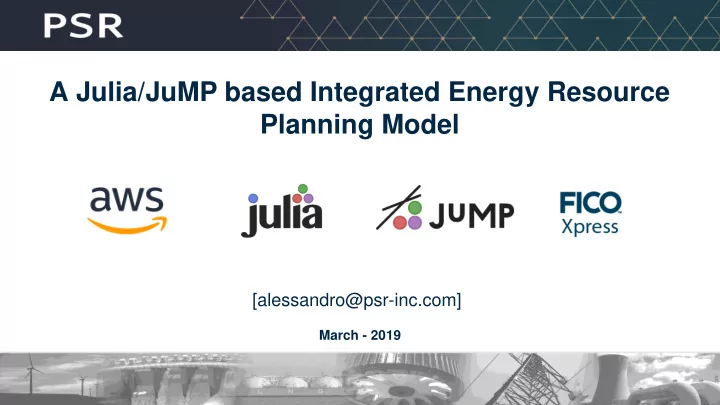

A Julia/JuMP based Integrated Energy Resource Planning Model [alessandro@psr-inc.com] March - 2019
Quick Introduction ► Graduated in Electrical and Control Engineering at PUC-Rio ► Currently doing Masters in Optimization at PUC-Rio ► Optimization Engineer and Developer at PSR since 2017
Motivation ► Hourly resolution ► Unit commitment constraints ► Ramping constraints ► Exogenous calculation of system requirement reserve due to VRE intermittency and unpredictability
Renewable generation - Investment Cost
Renewable generation - Capacity Factor (efficiency)
Global investments in renewable energy - Bloomberg
German system - Challenges
Consequences? ► High variability and uncertainty in the offer ► Large generation ramps ► Excess/Lack of generation ► Need for more system reserve ► Need for more thermal flexibility ► Thermal unit commitment influences expansion planning decision!!
Challenges ► An expansion planning model with an hourly time step ► Unit commitment in expansion planning ► Co-optimization of expansion planning and system reserve requirement (due to renewable penetration) modeled as an exogenous variable ► Solving a MIP with all of that in a reasonable amount of time !
The Model - OptGen
Formulation – Objective Function 𝑦,,𝑟,𝑤 𝑛𝑗𝑜 𝐽 𝑗 𝑦 𝑗,𝑢 + 𝑑 𝑘 𝑘,ℎ 𝑢 𝜗 𝕌 𝑗 𝜗 𝐽 ℎ 𝜗 𝐼 𝑘 ∈ 𝐻
ҧ Formulation – Constraints 𝑢 𝒕 Hydro maximum storage 𝑤 𝑗,𝒖 ≤ 𝑤 𝑗 𝑦 𝑗,𝜐 𝜐=1 𝑢 𝒕 𝑟 𝑗,ℎ ≤ ത 𝑟 𝑗 𝑦 𝑗,𝜐 Hydro maximum turbining 𝜐=1 𝒕 + 𝑏 𝑗,𝑢 𝒕 − 𝑟 𝑗,𝑢 𝒕 − 𝑥 𝑗,𝑢 𝒕 + 𝒕 + 𝑥 𝒕 𝒕 𝑤 𝑗,𝑢+1 = 𝑤 𝑗,𝑢 𝑟 𝑘,𝑢 Water balance constraint 𝑘,𝑢 𝑘 𝜗 𝑁 𝑗
ҧ Formulation – Constraints 𝑡 ≤ 𝑘,ℎ 𝒕 𝑡 𝑘 𝑧 𝑘,ℎ ≤ 𝑘 𝑧 𝑘,ℎ Thermal min/max generation 𝑢 𝒕 𝑧 𝑘,ℎ ≤ 𝑦 𝑘,𝜐 Commitment constrained by investment decision 𝑘=1 𝑢 𝑡 𝒕 𝑚,ℎ ≤ 𝐻 𝑚 𝑦 𝑚,𝜐 Wind and Solar max generation 𝜐=1
Formulation – Constraints +𝑡 ≤ ത 𝑔 𝐺 𝑙 𝑙,ℎ Max capacity −𝑡 ≤ ത 𝑔 𝐺 𝑙 𝑙,ℎ −𝑡 = 1 +𝑡 − 𝑔 𝑔 ΔΘ 𝑙,ℎ Second Kirchhoff Law 𝑙,ℎ 𝑙,ℎ 𝐵 𝑙
Formulation – Constraints +𝑡 − 𝑔 +𝑡 − 𝑔 −𝑡 + 𝜗 ℎ = 𝑒 ℎ −𝑡 𝑘,ℎ + 𝜍 𝑗 𝑟 𝑗,ℎ + 𝑚,ℎ + 𝐸 𝑐,ℎ − 𝐷 𝑐,ℎ 𝑔 − 𝑔 𝑙,ℎ 𝑙,ℎ 𝑙,ℎ 𝑙,ℎ 𝑘 𝜗 𝐾 𝑗 𝜗 𝐼 𝑗 𝜗 𝑆 𝑐 𝜗 𝐶 𝑙 𝜗 𝐶 𝑢𝑝 𝑙 𝜗 𝐶 𝑔𝑠𝑝𝑛 Deficit Thermal Hydro Renewable Battery Net First Kirchhoff Law and Generation Generation Generation Generation Load
Formulation – Constraints 𝑡 𝑡 ≤ 𝑆 𝑉𝑄 𝑘,ℎ − 𝑘,ℎ−1 Ramp 𝑡 𝑡 ≤ 𝑆 𝐸𝑂 𝑘,ℎ−1 − 𝑘,ℎ 𝑡 ≥ 𝑧 𝑘,ℎ 𝑡 − 𝑧 𝑘,ℎ−1 𝑡 𝑡𝑢 𝑘,ℎ Start-up
Formulation – Constraints 𝑦 𝑗,𝑢 ≤ 1 𝑢 𝜗 𝕌 𝑦 𝑘,𝑢 ≤ 1 Investment Decision Constraint 𝑢 𝜗 𝕌 𝑦 𝑚,𝑢 ≤ 1 𝑢 𝜗 𝕌
Formulation – Constraints 𝑡 + 𝑡 + 𝑡 𝑉𝑄 Reserve Balance 𝑠 𝑠 𝑠 ≥ 𝑆 𝑏,ℎ 𝑐,ℎ 𝑘,ℎ 𝑗,ℎ 𝑘∈𝑏 𝑗∈𝑏 𝑐∈𝑏 𝑡 ≤ ഥ 𝑡 𝑡 Thermal reserve 𝑘,ℎ + 𝑠 𝐻 𝑘 𝑧 𝑘,ℎ 𝑘,ℎ 𝑡 + 𝑠 𝑡 ≤ 𝐼 𝑗 𝑦 𝑗,𝑢 𝑗,ℎ Hydro reserve 𝑗,ℎ 𝑡 𝑡 𝑐,ℎ + 𝑠 ≤ 𝐶 𝑐 𝑦 𝑐,𝑢 Battery reserve 𝑐,ℎ
Ƹ Formulation – Constraints 𝑡 Forecast Generation 𝜉 𝑚,ℎ = 𝐹[ 𝑚,𝑛,ℎ ] 𝑡 − Ƹ Forecast error 𝑡 𝜀 𝑏,ℎ = 𝑚,ℎ 𝜉 𝑚,ℎ 𝑦 𝑚,𝑢 𝑏 𝑚∈𝐵 𝑚 Hourly Variation in 𝑡 𝑡 𝑡 𝛦 𝑏,ℎ ≥ 𝜀 𝑏,ℎ −𝜀 𝑏,ℎ−1 Forecast error 𝑉𝑄 ≥ (1 − 𝜇)𝐹[𝛦 𝑏,ℎ 𝑡 ] + 𝜇𝐷𝑊𝑏𝑆 𝛽 𝛦 𝑏,ℎ 𝑡 Dynamic Probabilistic 𝑆 𝑏,ℎ Reserve Criteria
Assumptions and Approximations – Rolling Horizon
Assumptions and Approximations – Daily Aggregation
Basic Structure
International Studies – Chilean Energy System http://generadoras.cl/prensa/mayor-aporte-solar-y-eolico-reducira-al-25-la-generacion-termica-al-2030-en-chile http://generadoras.cl/prensa/generadoras-participo-en-seminario-internacional-de-energia-renovable-variable-erv
International Studies – Brazilian Energy System http://www.epe.gov.br/en/press-room/news/-cem-days-integration-of- https://www.giz.de/en/worldwide/12565.html renewables-in-the-electric-sector-paths-and-challenges-to-energy-planning
Chilean System Study Example ► 13 years horizon ► 54 scenarios ► 300 thermal plants (100 projects) ► 650 wind and solar plants (500 projects) ► 100 hydro plants ► 12 transmission lines / 6 buses (simplified network) ► ~ 5.6 MM constraints per year ► ~ 7.8 MM variables ( 3 MM integer ) per year
Solving the Model ► FICO Xpress 8.5 solver ► c5.9xlarge amazon instance - 3.0 GHz Intel Xeon Platinum processors - 36 vCPU - 72 GB RAM ► Xpress control parameters were tuned by Xpress lead developer (Michael Perregaard) ► Solve time: ~ 240 minutes per year
Results - Incremental Expansion
Results - Wind and Solar complementarity
Results - Marginal Costs
Brazilian System Study Example ► 1 year horizon ► 10 scenarios ► 600 thermal plants (400 projects) ► 100 wind and solar plants (30 projects) ► 200 hydro plants ► 10 battery projects ► 50 transmission lines / 30 buses (simplified network) ► ~5 MM constraints per year ► ~4 MM variables (1 MM integer) per year
Solving the Model ► FICO Xpress 8.5 solver ► c5.9xlarge amazon instance - 3.0 GHz Intel Xeon Platinum processors - 36 vCPU - 72 GB RAM ► Xpress control parameters were tuned by Xpress lead developer (Michael Perregaard) ► Solve time: ~ 70 minutes
Incremental Expansion
Installed Capacity 2017 ~2036
Thanks! alessandro@psr-inc.com www.psr-inc.com psr@psr-inc.com +55 21 3906-2100 +55 21 3906-2121
Recommend
More recommend